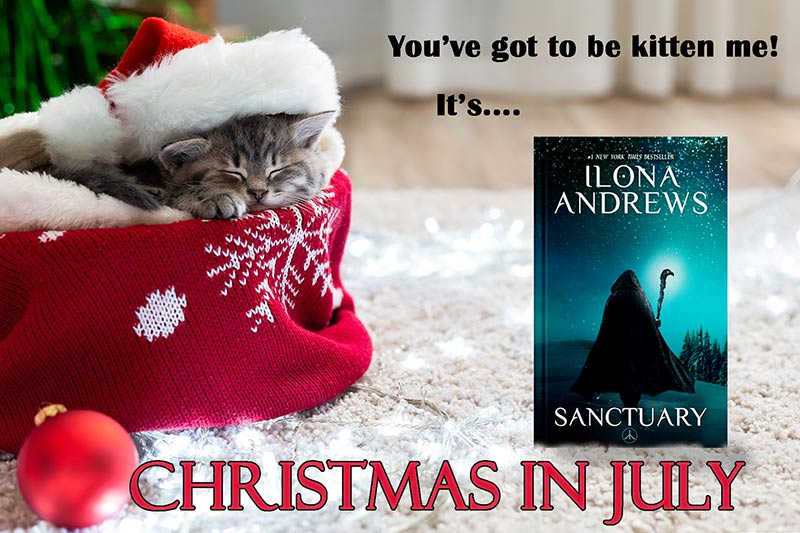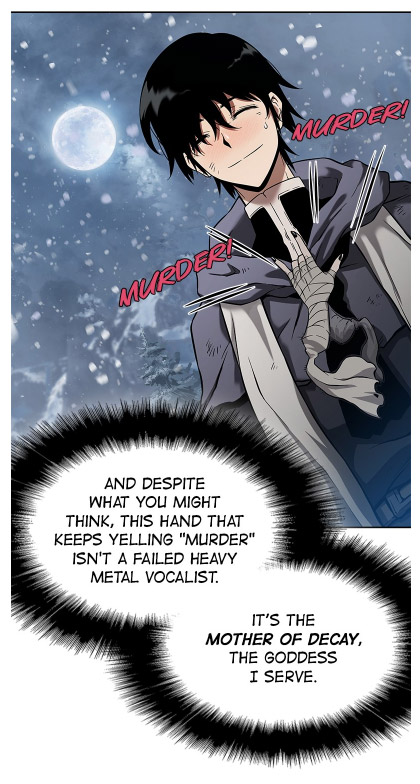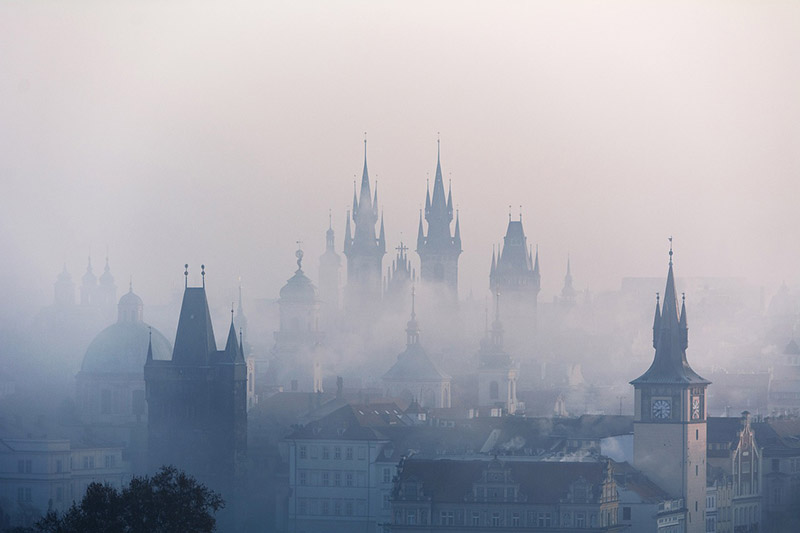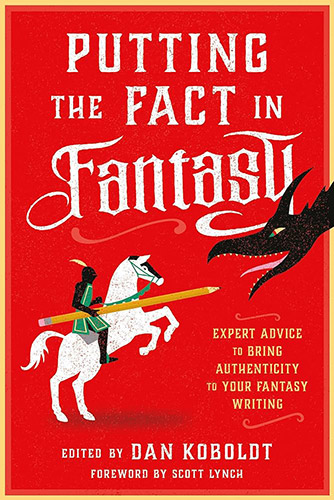
Tuesday our internet went out because Hurricane Beryl nuked Spectrum’s tower in Houston. That’s on the heels of our AC unit busting a leak in the evaporator coil. We have more than one AC unit, but yeah, half of the house is pretty warm. Gordon kept promising to sleep on the couch due to the temperature and yesterday we did. It was okay. The AC should be fixed today.
At least we have power. Poor Houston. What the hell is CenterPoint doing over there?
We are experimenting with new promotional strategies, so over the next three weeks we will be releasing promotional trailers for Sanctuary. If you follow us on the social networks, the algorithm will likely feed it to you more than once. We apologize for the inconvenience and we will try to vary our content.
As a flip side of the coin, we got complaints that some people couldn’t see the trailer because they didn’t follow us on socials and felt left out. Today I bring you the first two trailers. Also, I made a TikTok account and uploaded it there. It had 0 views yesterday. Heh.
Chris Brinkley very generously agreed to record some sneak peeks for us.
Now that the promo is out of the way, onto reader questions.
As an author, why do you think so many authors avoid discussing religion, even though it is such a dominant force in contemporary and especially in previous civilizations? It seems like a crucial part of world-building that everyone has collectively decided to ignore
Oo, I have a good book recommendation for you.
It is an anthology of essays by renowned fantasy authors and experts, including topics like Historically Accurate Ways to Die and Horse Psychology 101. It has several essays on religion in fantasy. In particular, Prophets, Preachers, and Priests in Fantasy by Jay S. Willis is very interesting.
“Fiction, especially science fiction and fantasy, is filled with various belief systems, and the priests, penitents, and petitioners following said religions form strong foundations for good world-building and typically drive the story. Imagine Star Wars without the Force and the Jedi, Dune without the Bene Gesserit, the Wheel of Time without the Children of Light or the Aes Sedali. All of those religious institutions are important, but what is truly vital in driving them and the stories about the are the characters’ actions and reactions to them.
Prophets, Preachers, and Priests in Fantasy by Jay S. Willis.
As you can see from the above examples, it isn’t fair to say that everybody ignores religion in sci-fi and fantasy. Warhammer Universe runs on religion. So does Gideon the Ninth. The hugely influential Small Gods by Terry Pratchett. NK Jemisin’s Hundred Thousand Kingdoms. Chalion series by Lois McMaster Bujold. In YA, we have Percy Jackson and His Dark Materials. I could keep going. In fact, I am reading a manhwa right now that is all about religion.

Cleric of Decay on Webtoon. Amazing series.
Roman’s novella is all about religion. Then, to pull from the project that I can neither confirm, nor deny:

Next, we went to the Temple of the Dridag. There wasn’t an equivalent English word for that term, but the closest would’ve been final caretaker. It evolved from drid, meaning walking cane in the Old Tongue, and was pronounced as dreedekh, with g being almost silent. The dridags assisted the elderly at the sunset of their lives: they helped them with their physical needs, provided companionship, and held their hands through the final moments. To tell someone, “Time for your dridag,” was a fatal insult, because it meant you were wishing for their death.
The Temple dedicated to the Aspect of the Dridag handled the funeral arrangements and managed the cemeteries. No matter what Aspect a Rellasian worshipped during their lives, once they died, the care for their bodies and souls passed to the clerics of the Dridag. Their temple was beautiful, filled with plants, light, and indoor fountains, with the statue of Aspect of the Dridag carved out of soft white stone. He wore an artfully draped hooded robe with twin corsages of stone flowers blooming on his chest, one on each side. A necklace of wooden and stone beads hung around his neck. He was depicted in midstride, his eyes downcast. His face within the hood was at once serene and mournful.
The contrast between the long lines and drudgery of the Scribes and the verdant serenity of the Dridag’s temple slapped you in the face. One was dedicated to busyness of life, the other to the calmness of death, and there was probably a deep point in there somewhere, but I’d been tired of walking, so I just waited for our turn to be seen and tried not to think of the Butcher.
Back to the question: yes, religion is a fundamental block of fantasy worldbuilding, but writers must pick and choose what we show to the readers. Sometimes a deep dive into religion would distract from the narrative. Everything must play a significant part in the story.
Religion is also a hot potato topic in real life. This year, when I wished everyone Happy Holidays, a commenter on the Facebook left a comment that said roughly, “I would wish you Merry Christmas but it’s clear that you hate Christianity.”
I don’t hate Christianity. I just happen to be well educated in it. It was completely accidental. I was given a scholarship to a high school where Christian education was required, so I studied the Bible as an academic text and toured services of every denomination available in Dillard, Georgia, from moderate Baptists to mountain preachers who screamed at you to be saved at every service, because once was not enough and you would surely go to hell. Heh. One of my daughters is a Catholic, although she might be Russian Orthodox now, and the other is a Methodist. Neither of us discouraged them from finding their faith.
I got this comment because I note the ugly side of religion when people caught up in it do inhuman things like skinning a woman alive with broken temple tiles.
“Revered Hypatia, ornament of learning, stainless star of wise teaching, when I see thee and thy discourse I worship thee, looking on the starry house of the Virgin [Virgo]; for thy business is in heaven.”
Palladas, Greek Anthology (XI.400)
Every religion, no matter how benign, has skeletons in its closet, because faith is power and humans are flawed. Our job, as writers, is to remind our readers how dangerous religion can be. It is meant to offer solace and peace, not to blind and whip up rage.
Not everyone is down for frank discussions of religion. As authors, we know this because we get hate mail, so we try to do our discussing within the narrative and some people avoid it altogether.
With that in mind, we are opening this post to suggestions of fantasy and science fiction books that deal with religious themes.




Jeremy Robinson often weaves in religion, with The Didymus Contigency as the most direct example. Raymond Feist and Janny Wurts were early favorites.
I want to thank you for the discussion about religion. I’m not eloquent and reading something about religion that speaks to me on a fundamental level is rare. I have devout individuals in my life. Some of them are lovely, some not so much just as with non- devout people. Your words truly spoke to me.
💯
In C.E. Murphy’s Urban Shaman series, Joanne Walker (aka Siobhan Walkingstick) her emerging magic requires her to tap into both her Cherokee and Irish heritage, as she encounters powers and gods from both traditions.
Religion is featured in MCA Hogarth’s Peltedverse series, especially in how the Eldritch world’s worship of the Lord and Lady is interwoven with the world’s feudal system.
W.R. Gingell’s Christian faith is much more subtly embedded in her books – specifically in the redemption arc of Athelas, the murderous, conflicted “twisty old fae” who, as steward of a remorseless fae lord, murdered the parents of Ruth (aka Pet in the prior Between series) and tries to kill her later.
*Spoiler*
*
*
*
Athelas spends most of the follow-up Behind series trying to earn Ruth’s forgiveness, only to find he simply had to sincerely ask for it.
Magic in Deborah Wilde’s Unlikeable Demon Hunter is presented as part of the Jewish tradition, with a rabbi training and sending out the demon hunters. Of course, the hunters are all male until Nava Katz accidentally becomes one during her brother’s induction ceremony.
Deborah Ann Gilman’s 19th century Western novella features a shomer (roughly, a practitioner of prayer-based protector magic) from an Eastern European shtetl, journeying through the Wild West to a settlement whose shomer has died without a successor. So far, this story is for Patreon subscribers only but will hopefully be published soon.
Anne Bishop’s The Others books have an interesting human religion which seems to help people dealing with the stress of living with, hmm, a more dominant species.
I find Terry Pratchett’s Death (especially in Hogfather) and Diane Duane’s Wizard series to be very influential in my own faith. I was going to mention the Aeslin mice in Seanan McGuire’s books but her take on the afterlife is also profoundly religious.
lots of people have mentioned CS Lewis but I also enjoyed his friend Charles Williams’s books. He has some jarring prejudices and he probably needs a warning label, but his account of the Holy Grail is so well done. Williams died young and has been largely forgotten.
James Blish wrote an amazing book about evolution, Catholicism, and demons, and Frank Herbert updated Dante’s Inferno, but it was quite well done, with Mussolini taking over for Virgil….
Lilith Saint Crowe has at least 4 series with religious aspects, and what is even more notable is how very different her writing style varies. Spring’s Arcana, Jill Kismet, Dante Valentine, and Hostage of Empire (as SC Emmitt) are all excellent.
Sharon Shinn’s Angel books are another take on religion that I found fascinating, especially as a not-religious person.
I scrolled all the way through to make sure but no one mentioned the malazan book of the fallen series by Steven Erickson…. my other favorite author. I’ve been wondering if there is any crossover between the BDH and the malazan fans…. of course it’s not urban fantasy but the the most epic of epic high fantasy. the world building is done on a massive scale. unlike in the Kate daniels series he made everything up from scratch but i love the similarity of the idea that the faith of the believers are powering the gods and their magic. they are at the mercy of the people who pray to them in a very literal way… that’s such a neat idea. it’s in other series as well of course… In my experience more fantasy and sci-fi has religion than doesn’t. especially series with real fleshed out immersive world building. it seems to be critical to that.
when I was a kid my favorites were Anne McCaffery, Mercedes lackey and Madeline l’engle. l’engle has lovely strong Christian undertones that resonate in a non preachy love and good over hate and evil sort of way. Mercedes lackey is fun and more made up. Anne McCaffery probably in the more secular version of Sci fi but she still had strong themes of love and goodness and be a good steward of nature…. I can think of so many more…. old school ones like Lloyd Alexander and Susan Cooper.
I am leaving for the beach tomorrow and might start the paladin series after reading this thread. good choice?
Thank you for opening this discussion on a topic that’s difficult to write about and sometimes fraught with emotions. That being said, I enjoy the Dresden Files portrayals of the power of belief systems and wish I could meet a real life Michael Carpenter. I wouldn’t mind hanging out with Mercy Thompson either. Patricia Briggs has done a great job of creating a main character who is a balance of belief systems that are often portrayed as conflicting, but needn’t be.
I would echo those who mentioned the Malazan books by Steven Erikson. They deal heavily with gods and faith. The latest one features a god who believes that faith in anything beyond yourself is a weakness – despite his followers having faith in him.
They’re quite dark, but I would also recommend the Prince of Nothing trilogy by R Scott Bakker. One of the plotlines involves a Messiah-figure who may or not be a psychopath.
firebird trilogy.
I read it 10+ years ago, so don’t expect any quotes. I think the 3rd book is where it went more religious. not exploring religion, but more of drawing parallels/using religion to continue the plot.
Oh, I am so ready!
Religion is a primary cultural driver, but even the most devout people I know don’t talk about it 24/7. There is plenty of religion in the KD series, which is to be expected as people cope with the huge changes (I love the idea that everyone rushes to the goddess of midwifery as they need her.) I also find it ironic that Kate calls on what appears to be a Christian god in times of great stress, yet reminds the rabbis that Erra’s magic far predates anything they have to offer. We all need comfort sometimes.
What bugs me is when the “normal” religious views exist alongside world systems that would clearly have a strong impact on them – the everyday existence of massively superpowered angels, for instance. I’m an atheist, so I’m more curious as to how those beliefs arise and evolve than the beliefs themselves, and sometimes, I just have to suspend disbelief in more ways than one.
A lot of fantasy features clerics and paladins who are aligned with deity.
Melissa McShane does a really interesting dive into religion in her Dragons of Mother Stone series where the beliefs of the dragons and the beliefs of the humans run right into each other. War of the Lich from Matt Summers is Knights of a Death god versus a Lich that brings people back from the dead. Game of Thrones has a strong through line about religion. It’s such a strong part of life and society that I can think of more sff that includes some nod to religion than those who don’t. Even television shows like Battlestar Glactica and Firefly have central religious characters and interaction with the plotlines.
My first thought was T Kingfisher’s Temple of the Rat God from the Paladin series and other novelsset in the same world. What could be better than a priesthood of lawyer-fixers dedicated to righting wrongs for the supplicant victims of injustice?
My second thought was Bujold’s world of the Five Gods as portrayed in her Penric and Desdemona series. This lengthy series of mostly novellas seems to be Bujold’s passion project and consists of the adventures of accidental sorcerer Penric and the long-lived “demon” Desdemona with whom he enjoys a mutually possessed relationship. The P&D stories share the Chalion world but are set in an earlier time, I believe.
Both these series would qualify as cozy fantasy and feature religions that I would embrace in a hot minute.
Oh yeah, and every Pratchett novel featuring Death totally describes a religious belief system, as do many of his other works. Small Gods is just the tip of the iceberg.
I just did a walmart run for more watermellon and i can’t tell you how absolutely thrilled i was to see Burn For Me and White Hot on the shelf Wow
it was like i struck it rich…
personally i think all your books should be more publicly available for us
really non tech humans who don’t do online stuff very well
going to go sit in front of the fan and enjoy my watermellon and new treasures
older copies are pretty ragged
big hugs
sorry but i couldn’t find where else to put this
DK
Not sure you can talk about religion in fiction without mentioning Terry Pratchett … lots of themes about belief becoming real, i.e., believe in a god/goddess of something and if belief is strong enough it creates that being (I’ve taken up a belief in The Little God of Traffic Lights myself, but there also has to be a God of Parking – just ask and yea shall receive!)
I also love Terry Pratchett’s “Hatful of Sky” series about strong women working around organised religion/patriachal societies. Plenty of other really old-school SF writers also play with religion/belief systems as well as ‘what is humanity’ (Philip K Dick, Gordon R Dickson, James Blish, Mercedes Lackey, etc.). And if you want to go venturing into “challenge the patriachy” (because what else is organised religion if not a patriachy!) try Lauretta Hignett who has some very thought-provoking and challenging info woven into her stories. The joys of reading!
DC comics is a good example of everything you shouldn’t do. When it comes to characters and religion. Don’t get me wrong the stories are great but… with the multitude of writers and the decades of comics created.
The need to make certain characters very powerful. Too creating new characters that mess up… Everything.
The best example of this is actually Titans Raven. The original series had aspects of Christianity mythology as a base line for Raven & Trigon. With the Azarathians seeming to be a bit Buddhist in style. This wasn’t such a bad thing. Great concept and great story writing, but then we got John Constantine and his appearances in the Swamp Thing series and when Constantine came along so did the Christian faith along with him. Again this isn’t a bad thing. Great concept and storyline.
The problem is that now we have this entire confusion about what Trigon is and What Raven is. They call her a witch or a demon or whatever the 🤬 she is because they can’t make up their goddamn minds. So to make it easier they just try to slot her existence into the Hell dynamic. Which doesn’t work because of Constantine setting up the religion in the Universe.
So now you end up with 2 characters that are so powerful that they destroy Universes with ease but can also be taken out by characters like Kiteman with ease…
Don’t do this. Be consistent. You’ll have more readers that way.
This is NOT a fantasy for everyone, but Jaqueline Carey’s series that begins with Kushiel’s Dart is, IMO, outside of these esteemed authors, some of the best written out there. In its entirety, there are 9 books, 3 for each main character’s story line.
The entire premise is a trigger warning for anyone sensitive to topics of a sexual nature.
But the world and story lines are all deeply dependent on the idea of faith and how the spiritual world interacts with our world.
I know I’m late to the party, but WOW, the Roman video is fantastic! When you start getting offers for movie deals, please just don’t let the movie be too gory for some of us gentler readers.
Roger Zelazny’s ‘Lord of Light’, a sci-fi bringing-to-life of the Hindu pantheon, was an early favorite of mine. I also loved his short, ‘The Agnostic’s Prayer’, in which he writes a prayer devoid of any belief, just as an exercise in hilarity. “Insofar as I may be heard by anything, which may or may not care what I say…” The man was brilliant.
The Sparrow by Mary Doria Russell
Gordon R. Dickson’s Dorsai books are among my favorites. They look at religion and values as humanity expands out into the universe.
Anne Bishop’s Ephemera series offers a really unique view on how religious values shape the world around us – figuratively and literally.
Thank you for the trailers. I wasn’t able to watch it on Instagram because I don’t have an account. Or maybe I did at one point, and have forgotten the password. Whatever. Both the trailer and the reader samples are excellent! I love the reader’s voice — so deep and passionate! Looking forward to the book.
Duuude! The promo rocks! Just enough suggested but nothing that cramps/conflicts with what my imagination has come up with. Great balance! Also, i had to giggle-squee at the Nechist Productions & logo. Adorbs! All hail the AuthorLords!!!
What comes to mind for me is The Foundation series by Isaac Asimov, in which the storyline actually made a religion of the ability to look forward to social, economic, and human trends, and make fairly accurate predictions of how the civilization in the story was going to progress or regress over hundreds to thousands of years. Very well written, and showed the benefits and dangers of making religious doctrine.
Another example for me is a series of books by Charles DeLint, featuring how the fae and previous/elder gods and supernatural beings co-exist in current human civilization. You can see the various beliefs and gods woven throughout most of the stories.
Finally, I think Mercedes Lackey’s Valdemar series would show the shamanistic as well as the more established religions of the various societies and civilizations in her books: many have a pantheon of gods, or one god or goddess, while Valdemar itself is a melting pot of belief systems, with the only law “There is no one true way”.
I would say my love of books, and through them my exposure to so many different ideas of society, love, religion, and life, helped shape a person who tries very hard to uphold the ideal that what you feel is your faith or belief is personal. In my belief, there is no need to convert others to validate it. Sometimes I even succeed a bit, but hey, I’m also a flawed human who likes to talk. A Lot.
I feel 100% sure that Rogan has a Generac. I just got my power back Monday night.
Sword of Truth series by Terry Goodkind. I enjoyed reading this series. It’s been a while but I remember this series had religion in it.